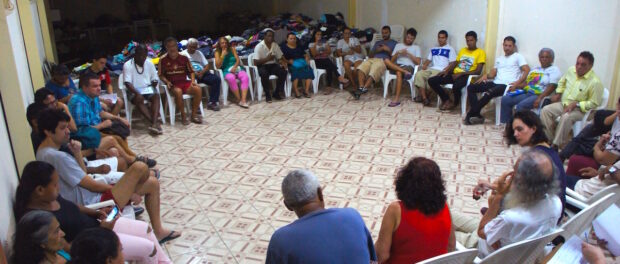
“We need to hold a demonstration. That’s the only way for these politicians in power to pay attention to us,” said a resident during a meeting about housing conditions held on April 13 at the Nossa Senhora de Boa Viagem Church in Rocinha. Organized by the Rocinha Sem Fronteiras (“Rocinha Without Borders”) collective, the meeting on the violation of the right to housing in Rocinha featured participation from Dr. Maria Júlia Miranda—coordinator of the Land and Housing Nucleus (NUTH) of the State Public Defender’s Office.
During the meeting, attended by approximately fifty people, participants discussed historical and current issues related to housing in favelas. In light of recent heavy rains in Rio, feelings of fear and indignation ran high. Due to the lack of slope containment and stabilization works, a number of residents lost their homes—whether to condemnation or landslides.
The meeting began in the format of a roundtable with commentary by Dr. Miranda, who described how her work influences and supports popular housing struggles. Thereafter, residents had the chance to raise questions and share opinions on the current situation in Rocinha. The meeting was led by José Martins, one of the founders of Rocinha Sem Fronteiras.
During the discussion, Simone Rodrigues—a resident of Rocinha of thirty years—affirmed: “It is necessary to advance and reinstitute land tenure regularization policies.” In addition to being a co-founder and coordinator of Rocinha Without Borders, Rodrigues lives in Laboriaux, the uppermost part of the community where some houses are located in areas of risk.
“The matter of urgency with regard to the right to housing is, without a doubt, regularization through upgrading, such as [the implementation of] containment walls to mitigate the risk of landslides, drainage, and basic sanitation; and the resumption of land regularization—which was interrupted by public authorities in 2010—so that residents have the right to tenure security,” said Rodrigues, who is a lawyer. She highlighted the importance of legal aid at this time.
“The law is a social construction that contributes to the popular struggle for the fulfillment of human and social rights. It also lends support to residents to confront the bureaucracy of public administration, such as through the provision of social rent,” Rodrigues added.
Following the meeting, NUTH coordinator Maria Júlia Miranda spoke with RioOnWatch on the content discussed at the event. Miranda stated that public authorities violate rights when they do not respect the need for improvements, such as to infrastructure and security.
“Housing is designated as a fundamental right in Article 6 of the Federal Constitution. According to General Comment #4 from the UN Committee on Economic, Social, and Cultural Rights, housing is adequate when there exists the security of tenure, the availability of services, infrastructure, adequate living conditions, affordability, and other criteria.” Thus, public authorities violate housing rights when they fail to adopt public policies that support favela upgrading, thus eliminating risks; the provision of services; and above all, the recognition of favelas as part of the city,” said Miranda.
According to Miranda, after the February storm, NUTH conducted a technical visit in Rocinha in order to identify the most impacted areas. NUTH’s proposed course of action involved public works to remove debris and stabilize the slopes where landslides occurred in areas of the favela known as Macega, Terreirão, and 199, in addition to cleaning up Cachopa and seeking a solution for the building with an exposed foundation on Rua Dionéia. NUTH also requested that the Civil Defense inspect properties located near slopes and provide rental assistance for families required to leave their homes.
“When there exists a risk to housing and to people’s lives, NUTH can create a lawsuit with the objective of obliging the responsible public entity to eliminate risks in the favela. However, given the delay in transforming legal recourse into action, lawsuits are the last resort—after all other potential avenues have been exhausted—to force those responsible to comply with the measures that are required by law,” she concluded.
The meeting brought clarity to the situation for the residents present, which was perceptible at the end of the meeting. Participants emerged more confident, believing in the potential to change the situation. Statements like “We need to come together again” and “Let’s get organized” could be heard. The audience came together by exchanging hugs and encouraging words, ultimately bolstering hope and the intention to influence public authorities to pay attention to the situation in Rocinha.



